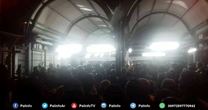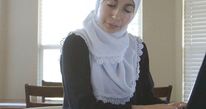28 dec 2018

World’s seventh largest bank, HSBC, has divested from Israeli weapons maker Elbit Systems over human rights concerns, in a move seen as a victory for the Boycott, Divestment and Sanction (BDS) movement that fights Israel’s occupation of Palestine.
While HSBC had yet to officially announce the decision, informed sources within the UK-based bank confirmed Thursday that it had ended its investments in Elbit, one of Israel’s biggest military contractors.
The company states that although it never takes sides on political issues, it still "observes international human rights principles" that govern businesses.
British activist group “War on Want” announced Thursday that HSBC decided to divest from Elbit after receiving over 24,000 emails from people concerned about its ties to Elbit and other firms that helped Israel suppress the Palestinian people.
In their emails, the activists told HSBC that its involvement with the Elbit Systems violated the bank’s self-proclaimed policy of not providing financial services to “companies involved in the production or selling of cluster munitions.”
It also was in breach of the UN Guiding Principles on Business and Human Rights, the group added.
“HSBC has taken a positive first step in divesting from Elbit Systems, the notorious manufacturer of drones, chemical weapons, cluster bomb artillery systems, and other technology used in attacks against Palestinian civilians, and to militarize walls and borders around the world,” Ryvka Barnard, War on Want’s senior campaigner on militarism and security, said.
“Doing business with companies like Elbit means profiting from violence and human rights violation, which is both immoral and a contravention of international law,” she added.
Barnard noted that HSBC was still maintaining ties with over a dozen other Israeli firms involved in crimes against Palestinians.
In fact, HSBC’s $3.92 million investment in Elbit was a small fraction of the $1.05bn it has invested in companies that provided equipment to the Israeli military, according to War on Want.
Elbit Systems is Israel's second largest arms manufacturer, according to Who Profits, a group that tracks companies benefiting from Israel's occupation of Palestinian lands.
The Palestine Solidarity Campaign (PSC), another pro-BDS organization in Britain, also hailed the banking giant’s decision and called on other companies to follow suit.
Besides HSBC, other major companies such as Airbnb and Quakers in Britain as well as Leeds University have made similar announcements this year, joining the BDS movement.
PSC director Ben Jamal said HSBC's decision shows BDS' effectiveness "as a tactic against Israel’s continued flouting of international law and human rights.”
While HSBC had yet to officially announce the decision, informed sources within the UK-based bank confirmed Thursday that it had ended its investments in Elbit, one of Israel’s biggest military contractors.
The company states that although it never takes sides on political issues, it still "observes international human rights principles" that govern businesses.
British activist group “War on Want” announced Thursday that HSBC decided to divest from Elbit after receiving over 24,000 emails from people concerned about its ties to Elbit and other firms that helped Israel suppress the Palestinian people.
In their emails, the activists told HSBC that its involvement with the Elbit Systems violated the bank’s self-proclaimed policy of not providing financial services to “companies involved in the production or selling of cluster munitions.”
It also was in breach of the UN Guiding Principles on Business and Human Rights, the group added.
“HSBC has taken a positive first step in divesting from Elbit Systems, the notorious manufacturer of drones, chemical weapons, cluster bomb artillery systems, and other technology used in attacks against Palestinian civilians, and to militarize walls and borders around the world,” Ryvka Barnard, War on Want’s senior campaigner on militarism and security, said.
“Doing business with companies like Elbit means profiting from violence and human rights violation, which is both immoral and a contravention of international law,” she added.
Barnard noted that HSBC was still maintaining ties with over a dozen other Israeli firms involved in crimes against Palestinians.
In fact, HSBC’s $3.92 million investment in Elbit was a small fraction of the $1.05bn it has invested in companies that provided equipment to the Israeli military, according to War on Want.
Elbit Systems is Israel's second largest arms manufacturer, according to Who Profits, a group that tracks companies benefiting from Israel's occupation of Palestinian lands.
The Palestine Solidarity Campaign (PSC), another pro-BDS organization in Britain, also hailed the banking giant’s decision and called on other companies to follow suit.
Besides HSBC, other major companies such as Airbnb and Quakers in Britain as well as Leeds University have made similar announcements this year, joining the BDS movement.
PSC director Ben Jamal said HSBC's decision shows BDS' effectiveness "as a tactic against Israel’s continued flouting of international law and human rights.”

The Palestinian government decided, on Thursday, to ban entry of Israeli vegetables, fruits and poultry into the Palestinian market, following an Israel ban on import of similar Palestinian products.
The cabinet said, in a statement following its weekly meeting held in Ramallah, that “in accordance with the principle of protecting the local produce and the Palestinian farmer in order to achieve the government’s policy of supporting the steadfastness of the Palestinian farmers and in light of the unilateral Israeli decision to prevent the entry of Palestinian vegetables and fruits into Israeli markets, the government decided to prevent the entry of all kinds of vegetables, fruits and poultry into the Palestinian markets.”
Israel took its action against the Palestinian produce after the Palestinians decided not to allow, into their markets, live sheep imported by Israelis, in order to protect the local livestock farmers.
The cabinet said, in a statement following its weekly meeting held in Ramallah, that “in accordance with the principle of protecting the local produce and the Palestinian farmer in order to achieve the government’s policy of supporting the steadfastness of the Palestinian farmers and in light of the unilateral Israeli decision to prevent the entry of Palestinian vegetables and fruits into Israeli markets, the government decided to prevent the entry of all kinds of vegetables, fruits and poultry into the Palestinian markets.”
Israel took its action against the Palestinian produce after the Palestinians decided not to allow, into their markets, live sheep imported by Israelis, in order to protect the local livestock farmers.
24 dec 2018

Dozens of Palestinian farmers rallied on Monday at the Jalama checkpoint, north of Jenin, protesting Israel’s ban on the export of vegetables to territories occupied in 1948.
Palestinian farmer Ahmad Saba’na said the ban has resulted in financial damage as hundreds of kilograms of fruits and vegetables have been piled up for eight days running.
He added that hundreds of farmers are on the verge of going bankrupt due to the Israeli measures.
Some eight days ago, the Israeli minister of agriculture ruled that vegetable delivery into Palestinian territories occupied in 1948 be banned in response to a decision by the Palestinian Ministry of Agriculture outlawing the import of sheep from illegal Israeli settlement outposts built on occupied Palestinian land.
Palestinian farmer Ahmad Saba’na said the ban has resulted in financial damage as hundreds of kilograms of fruits and vegetables have been piled up for eight days running.
He added that hundreds of farmers are on the verge of going bankrupt due to the Israeli measures.
Some eight days ago, the Israeli minister of agriculture ruled that vegetable delivery into Palestinian territories occupied in 1948 be banned in response to a decision by the Palestinian Ministry of Agriculture outlawing the import of sheep from illegal Israeli settlement outposts built on occupied Palestinian land.
19 dec 2018
The US violations against those demanding justice for the Palestinians have been stepped up recently, the latest of which was the CNN firing of anchor Marc Lamont Hill following his pro-Palestinian speech at the United Nations.
"We have an opportunity to not just offer solidarity in words but to commit to political action, grass-roots action, local action and international action that will give us what justice requires and that is a free Palestine from the river to the sea," Hill said in the speech.
Pro-Israel groups found that a chance to strongly criticize Hill and accuse him of anti-Semitism and of "planning to destroy Israel" and "following Hamas's path".
"We have an opportunity to not just offer solidarity in words but to commit to political action, grass-roots action, local action and international action that will give us what justice requires and that is a free Palestine from the river to the sea," Hill said in the speech.
Pro-Israel groups found that a chance to strongly criticize Hill and accuse him of anti-Semitism and of "planning to destroy Israel" and "following Hamas's path".
18 dec 2018

Veteran Israeli journalist Gideon Levy has reaffirmed his support for the Palestinian-led Boycott, Divestment, and Sanctions (BDS) movement, speaking in a Haaretz podcast interview.
Asked about the backlash against the boycott, both in Israel and in the United States,
Levy said that the BDS campaign is still “the only game in town”, a description he first used in 2016.
According to Levy, “one of the biggest successes” of the boycott has been the way it has “changed the discourse” internationally; now “people start to ask and question Zionism”, and whether “it is the only regime we can have in this piece of land”.
“This discourse is a very fascinating one,” Levy said.
Responding to the claims made by the Israeli government that the BDS movement is “anti-Semitic”, Levy dismissed such charges as “the automatic response of the Israeli propaganda against any criticism of Israel, not just BDS”.
Levy said he believes that as BDS gains more momentum, Israelis will move beyond simply dismissing the boycott as a form of anti-Semitism and ask if “there is something wrong about us”.
Despite the denial and aggression, Levy continued, “there is this knowledge that something is burning under our feet”.
Addressing the goals of the BDS movement, Levy said his understanding was that “it’s about changing the regime from an apartheid one to a democracy”.
~ Haaretz/Days of Palestine
Human Interest 12/14/18 Actress Natalie Portman says New Israeli Nation-state Law is ‘Racist’ and a ‘Mistake’
Asked about the backlash against the boycott, both in Israel and in the United States,
Levy said that the BDS campaign is still “the only game in town”, a description he first used in 2016.
According to Levy, “one of the biggest successes” of the boycott has been the way it has “changed the discourse” internationally; now “people start to ask and question Zionism”, and whether “it is the only regime we can have in this piece of land”.
“This discourse is a very fascinating one,” Levy said.
Responding to the claims made by the Israeli government that the BDS movement is “anti-Semitic”, Levy dismissed such charges as “the automatic response of the Israeli propaganda against any criticism of Israel, not just BDS”.
Levy said he believes that as BDS gains more momentum, Israelis will move beyond simply dismissing the boycott as a form of anti-Semitism and ask if “there is something wrong about us”.
Despite the denial and aggression, Levy continued, “there is this knowledge that something is burning under our feet”.
Addressing the goals of the BDS movement, Levy said his understanding was that “it’s about changing the regime from an apartheid one to a democracy”.
~ Haaretz/Days of Palestine
Human Interest 12/14/18 Actress Natalie Portman says New Israeli Nation-state Law is ‘Racist’ and a ‘Mistake’

